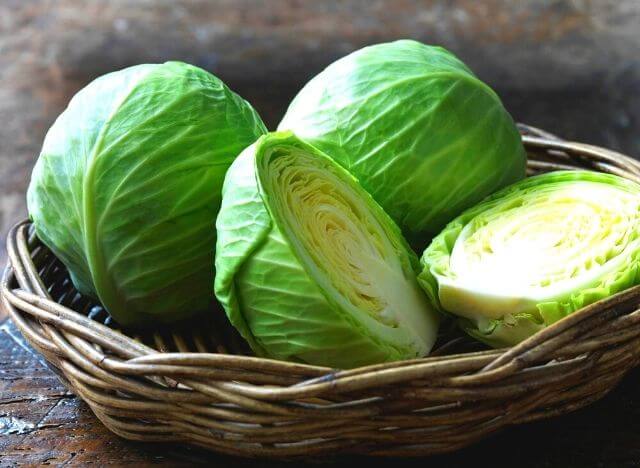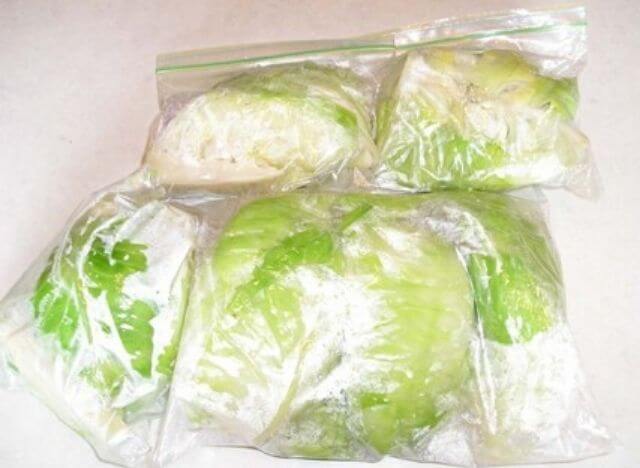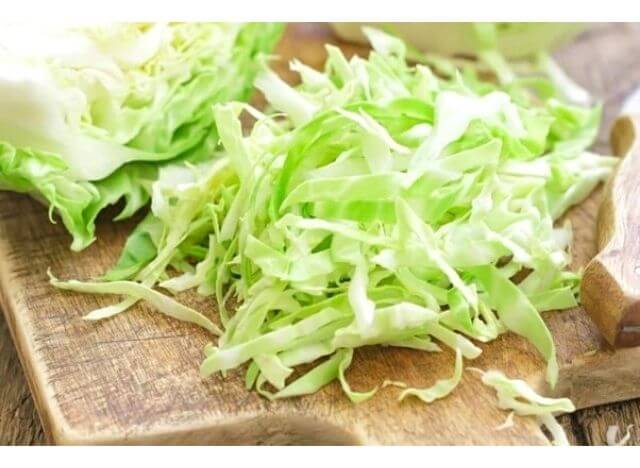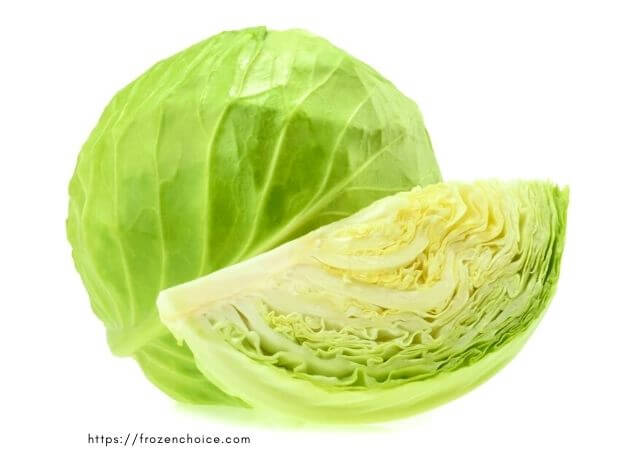Cabbage is a wonderful ingredient indispensable in many dishes, from salads, ground meats, casseroles to stir-fries and soups. Therefore, you will save a lot of time going to the market if you know how to store cabbage in the refrigerator for a long time.
Cabbage has a great texture and taste even when eaten raw with salad or cooked with meat. Although it has a great user experience, it is not without damage and decay. I still wonder what is the right way to freeze cabbage? Should it be blanched or unblanched before freezing? Now, after doing some research, I can share with you the ways to freeze unblanched cabbage to prolong its shelf life while preserving its amazing texture.
Read the article below for more information.
What are the benefits of cabbage?
Cabbage is a versatile food that provides a rich source of fiber and nutritional compounds, good for health. Because of these essential nutrients, cabbage is considered an indispensable food for the daily diet, especially for those who are on a diet or follow the eat clean diet.
Specifically, these substances include: vitamins B1, B2, B6, C, K, potassium and fiber. Also contains protein, selenium, magnesium, iron, chlorine, calcium. The iron content in cabbage is quite high, so it can help people with blood problems. In details, it can help to:
- Improve digestive system
- Keep blood pressure low
- Make your heart stay healthy
- Control and lower cholesterol levels
- May keep inflammation under control
From Asia to Europe, cabbage is loved almost everywhere in cooking, regardless of cooking cultures.

How to select the best cabbage types for freezing?
Choosing the delicious, fresh cabbage is a factor that helps to preserve cabbage for a long time, not afraid of spoilage. Keep these tips in mind to choose the best cabbages.
- Delicious cabbage is usually firm in hand, heavy in weight, braided leaves, firmly wrapped together, thick, closed head, small stalk.
- Cabbage leaves are light green, white-green, with purple cabbage, the color is dark purple, the leaves are crisp and hard.
- Do not buy cabbage with yellow leaves, brown spots on leaves, cracked core, brown stalks because it may be old, wilted cabbage.

Further reading: What Are the Best Cheap Freezers for Home Use?
Different ways to freeze the unblanched cabbage
Cabbage can be blanched or unblanched before freezing. We’ll provide ways to freeze unblanched cabbage, along with some tips and tricks to help with each. Depending on the texture and freezing time you want, choose the right way to freeze cabbage for best results. You can keep the unblanched cabbage in freezer for 1 or 2 months.
Freezing shredded or cut cabbage
In this process you have to shred or cut your cabbage to the size you wish and freeze them. This will freeze each strand or bite, avoiding damage to the cabbage. After defrosting they almost keep their shape.
The specific steps are:
- Chop the cabbage to the size you want
- Wash and dry the chopped cabbage
- Put them in a paper-lined tray
- Place in the freezer until completely frozen
- Remove the tray and transfer the frozen cabbage to an airtight container or bag

Freezing a whole cabbage
If you want to preserve the original shape of the cabbage from the place of purchase, then you are suitable for this method:
- Clean the cabbage by soaking them in 1 liter of water mixed with 1 cup of salt. This step helps to get rid of bugs, worms and diseased bacteria inside the cabbage.
- Pick up the cabbage and let it drain completely, you can place it on a plate or tray and blot with paper towels.
- Place the plate or tray in the freezer and let sit for 8 hours.
- Take it out, put it in an airtight container and continue to freeze.
Further reading: Best Containers for Freezing Food
How to defrost frozen cabbage?
Once we’ve finished freezing the cabbage, we’ll discuss the best way to defrost the cabbage when it’s ready to use.
The best way to defrost foods is to refrigerate them overnight. And then use the next day. You can plan your frozen cabbage usage time to allow time for this defrosting.
Do the following steps:
- Remove the right amount of frozen cabbage from the freezer and place in a deep bowl or plate.
- Cover the bowl with plastic wrap before putting it in the fridge.
- Leave them in the fridge until completely defrosted. Usually it will take about 1 day, but with large cabbage it can take up to 2 days.
- Once the cabbage has defrosted, pour the excess liquid out of the bowl and use the cabbage for cooking.
You can also defrost cabbage in water or in the microwave, but these methods run the risk of spoiling the cabbage and losing its texture.
Related questions
Should you blanch cabbage before freezing?
Yes, it is best if you blanch the cabbage before freezing. Even when you don’t blanch your cabbage before freezing, it will not harm you and you can still eat it. However, it is recommended to blanch your cabbage before freezing.
Blanching is the action of scalding cabbage in boiling water or steam it for a short time. Blanching prevents the enzyme actions which can cause the cabbage lose its flavor, color and texture. After blanching, it is best to quickly put the cabbage in ice water.
Blanching have following benefits:
- Keep the cabbage clean, free from any harmful organisms or dirt
- Brighten the color of your cabbage
- Retain the vitamins or nutrients
- Lengthen the time your cabbage safe in freezer
- Maintain the cabbage’s flavor or texture after thawing
While the unblanched cabbage can last about 1 or 2 months in freezer, the blanched cabbage can stay safe for up to 9 months.
How to freeze blanched cabbage?
- Wash and sock the cabbage: You should remove the tough outer leaves, rinse it thoroughly, and soak it in cold water for 30 minutes. These steps ensure to rid it of any worms, bacteria, or grit.
- Cut up the cabbage: Determine the size you want to freeze it and cut it accordingly, whole, sliced, or shredded.
- Blanch the cabbage: Drop your cabbage into a pot of boiling water. For a whole cabbage or sliced cabbage, you need to leave it in 2-3 minute. For shredded cabbage, it is usually about 1.5 minutes.
- Use ice water to cool the cabbage. Put it in a bowl of ice water for a while until it’s cool. Take the cabbage out of the ice water and wait until it dries. To prevent freeze burn, make sure it’s not wet.
- Quick- freeze cabbage. Make sure the cabbage is dry and place it on a baking sheet and put it in the freezer. This step does not apply to a whole cabbage. You need to spread the cabbage out on the sheet and put in in freezer for about 6 to 8 hours or overnight. Do not cover it.
- Finally, transfer the frozen cabbage into freezer bag. Squeeze out all the air, and tightly seal the bag and return the cabbage to the freezer. Label and date the packaging.
You can freeze the blanched cabbage for up to 9 months.
How to freeze cooked cabbage?
In case you have accidentally cooked too many cabbages, and want to save them for later meals. You can still freeze it.
Once the cabbage is done cooking, let it cool down. ABSOLUTELY DO NOT freeze hot cabbage. Make sure the cooked cabbage is cool and dry.
After that’s secured, transfer it to an airtight, airtight container or in a zip-lock bag. Try to get as little air inside the bag as possible, and then put it in the freezer.
Remember to label your container and your cooked cabbage will be safe in freezer for 3-5 months.
How to use frozen cabbage?
After thawing, the cabbage is ready to use for making cabbage rolls, coleslaw or similar dishes.

However, you do not need to thaw the cabbage if using it for soups, casseroles or crock pot stews.
It can also be used as single side dish like skillet cabbage and onions or stewed cabbage.
Conclusion
Cabbage is an excellent food source for a healthy diet. According to surveys in many countries, cabbage is the most popular frozen vegetable. Frozen cabbage is easy to make and retains its flavor even after thawing.
Do not hesitate to freeze unblanched cabbage so that you can cook it whenever you want. It’s best to use within 2 months.
Reference
1. You can freeze cabbage. Here is The Best Way, Ligia Lugo, Mar. 2021
2. How to freeze cabbage (Blanching or without blanching), cookingchew.com, Renee Groskreutz,
3. Health Benefits of Cabbage, healthline.com, Retrieved on Jan. 10, 2022

